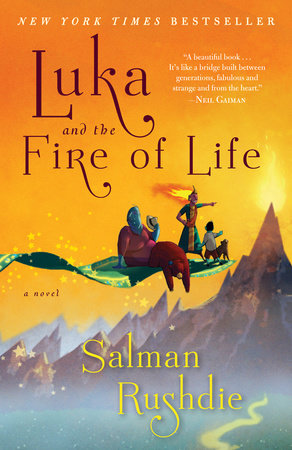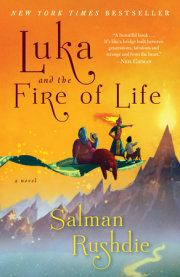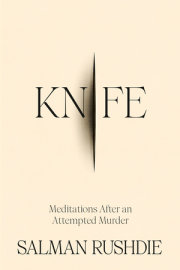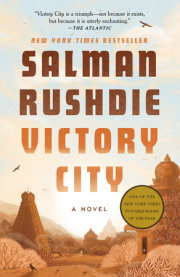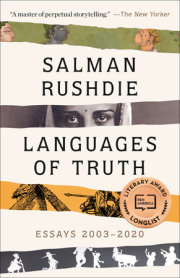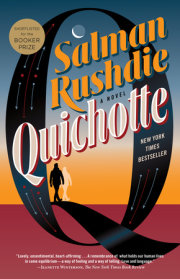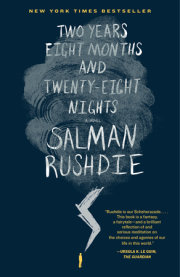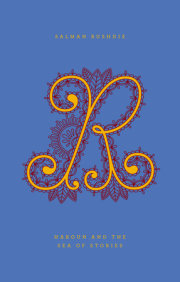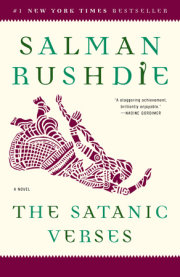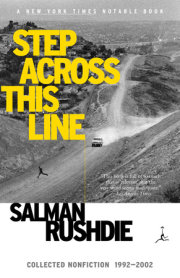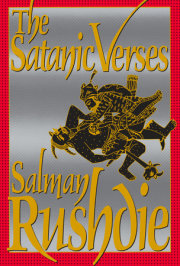Chapter One
The Terrible Thing That
Happened on the Beautiful Starry Night
There was once, in the city of Kahani, in the land of Alifbay, a boy named Luka who had two pets, a bear named Dog and a dog named Bear, which meant that whenever he called out, "Dog!" the bear waddled up amiably on his hind legs, and when he shouted, "Bear!" the dog bounded toward him, wagging his tail. Dog, the brown bear, could be a little gruff and bearish at times, but he was an expert dancer, able to get up onto his hind legs and perform with subtlety and grace the waltz, the polka, the rhumba, the wah-watusi, and the twist, as well as dances from nearer home, the pounding bhangra, the twirling ghoomar (for which he wore a wide mirror-worked skirt), the warrior dances known as the spaw and the thang-ta, and the peacock dance of the south. Bear, the dog, was a chocolate Labrador, and a gentle, friendly dog, though sometimes a bit excitable and nervous; he absolutely could not dance, having, as the saying goes, four left feet, but to make up for his clumsiness he possessed the gift of perfect pitch, so he could sing up a storm, howling out the melodies of the most popular songs of the day, and never going out of tune. Bear, the dog, and Dog, the bear, quickly became much more than Luka's pets. They turned into his closest allies and most loyal protectors, so fierce in his defense that nobody would ever have dreamed of bully_ing him when they were nearby, not even his appalling classmate Ratshit, whose behavior was usually out of control.
This is how Luka came to have such unusual companions. One fine day when he was twelve years old, the circus came to town-and not just any circus, but the GROF, or Great Rings of Fire, itself; the most celebrated circus in all of Alifbay, "featuring the Famous Incredible Fire Illusion." So Luka was at first bitterly disappointed when his father, the storyteller Rashid Khalifa, told him they would not be going to the show. "Unkind to animals," Rashid explained. "Once it may have had its glory days but these days the GROF has fallen far from Grace." The Lioness had tooth decay, Rashid told Luka, and the Tigress was blind and the Elephants were hungry and the rest of the circus menagerie was just plain miserable. The Ringmaster of the Great Rings of Fire was the terrifying and enormous Captain Aag, a.k.a. Grandmaster Flame. The animals were so scared of the crack of his whip that the Lioness with toothache and the blind Tigress continued to jump through hoops and play dead and the skinny Elephants still made Pachyderm Pyramids for fear of angering him, for Aag was a man who was quick to anger and slow to laugh. And even when he put his cigar-smoking head into the Lioness's yawning mouth, she was too scared to bite it off just in case it decided to kill her from inside her belly.
Rashid was walking Luka home from school, wearing, as usual, one of his brightly colored bush shirts (this one was vermilion) and his beloved, battered Panama hat, and listening to the story of Luka's day. Luka had forgotten the name of the tip of South America and had labeled it "Hawaii" in a geography test. However, he had remembered the name of his country's first president and spelled it correctly in a history test. He had been smacked on the side of the head by Ratshit's hockey stick during games. On the other hand, he had scored two goals in the match and defeated his enemy's team. He had also finally got the hang of snapping his fingers properly, so that they made a satisfying cracking noise. So there were pluses and minuses. Not a bad day overall; but it was about to become a very important day indeed, because this was the day they saw the circus parade going by on its way to raise its Big Top near the banks of the mighty Silsila. The Silsila was the wide, lazy, ugly river with mud-colored water that flowed through the city not far from their home. The sight of the droopy cockatoos in their cages and the sad dromedaries humphing along the street touched Luka's generous young heart. But saddest of all, he thought, was the cage in which a mournful dog and a doleful bear stared wretchedly all about. Bringing up the rear of the cavalcade was Captain Aag with his pirate's hard black eyes and his barbarian's untamed beard. All of a sudden Luka became angry (and he was a boy who was slow to anger and quick to laugh). When Grandmaster Flame was right in front of him Luka shouted out at the top of his voice, "May your animals stop obeying your commands and your rings of fire eat up your stupid tent."
Now it so happened that the moment when Luka shouted out in anger was one of those rare instants when by some inexplicable accident all the noises of the universe fall silent at the same time, the cars stop honking, the scooters stop phut-phuttering, the birds stop squawking in the trees, and everyone stops talking at once, and in that magical hush Luka's voice rang out as clearly as a gunshot, and his words expanded until they filled the sky, and perhaps even found their way to the invisible home of the Fates, who, according to some people, rule the world. Captain Aag winced as if somebody had slapped him on the face, and then he stared straight into Luka's eyes, giving him a look of such blazing hatred that the young boy was almost knocked off his feet. Then the world started making its usual racket again, and the circus parade moved on, and Luka and Rashid went home for dinner. But Luka's words were still out there in the air, doing their secret business.
That night it was reported on the TV news that, in an astonishing development, the animals of the GROF circus had unanimously refused to perform. In a crowded tent, and to the amazement of costumed clowns and plainclothes customers alike, they rebelled against their master in an unprecedented act of defiance. Grandmaster Flame stood in the center ring of the three Great Rings of Fire, bellowing orders and cracking his whip, but when he saw all the animals beginning to walk calmly and slowly to_ward him, in step, as if they were an army, closing in on him from all directions until they formed an animal circle of rage, his nerve cracked and he fell to his knees, weeping and whimpering and begging for his life. The audience began to boo and throw fruit and cushions, and then har_der objects, stones, for example, and walnuts, and telephone directories. Aag turned and fled. The animals parted ranks and let him through, and he ran away crying like a baby.
That was the first amazing thing. The second took place later that night. A noise started up around midnight, a noise like the rustling and crackling of a billion autumn leaves, or maybe even a billion billion, a noise that spread all the way from the Big Top by the banks of the Silsila to Luka's bedroom, and woke him up. When he looked out his bedroom window he saw that the great tent was on fire, burning brightly in the field by the river's edge. The Great Rings of Fire were ablaze; and it was not an illusion.
Luka's curse had worked.
The third amazing thing happened the next morning. A dog with a tag on its collar reading "Bear" and a bear with a tag on its collar reading "Dog" showed up at Luka's door-afterward Luka would wonder exactly how they had found their way there-and Dog, the bear, began to twirl and jig enthusiastically while Bear, the dog, yowled out a foot-tapping melody. Luka and his father, Rashid Khalifa, and his mother, Soraya, and his older brother, Haroun, gathered at the door of their house to watch, while from her verandah their neighbor Miss Oneeta shouted, "Have a care! When animals begin to sing and dance, then plainly some witchy business is afoot!" But Soraya Khalifa laughed. "The animals are celebrating their freedom," she said. Then Rashid adopted a grave expression, and told his wife about Luka's curse. "It seems to me," he opined, "that if any witchy business has been done it is our young Luka who has done it, and these good creatures have come to thank him."
The other circus animals had escaped into the Wild and were never seen again, but the dog and the bear had plainly come to stay. They had even brought their own snacks. The bear was carrying a bucket of fish, and the dog wore a little coat with a pocket full of bones. "Why not, after all?" cried Rashid Khalifa gaily. "My storytelling performances could do with a little help. Nothing like a dog-and-bear song-and-dance act to get an audience's attention." So it was settled, and later that day it was Luka's brother, Haroun, who had the last word. "I knew it would happen soon," he said. "You've reached the age at which people in this family cross the border into the magical world. It's your turn for an adventure-yes, it's finally here!-and it certainly looks like you've started something now. But be careful. Cursing is a dangerous power. I was never able to do anything so, well, dark."
"An adventure of my very own," Luka thought in wonderment, and his big brother smiled, because he knew perfectly well about Luka's Secret Jealousy, which was actually Not So Secret At All. When Haroun had been Luka's age he had traveled to the Earth's second moon, befriended fishes who spoke in rhyme and a gardener made of lotus roots, and helped to overthrow the evil Cultmaster Khattam-Shud, who was trying to destroy the Sea of Stories itself. By contrast, Luka's biggest adventures to date had taken place during the Great Playground Wars at school, in which he had led his gang, the Intergalactic Penguins Team, to a famous victory over the Imperial Highness Army led by his hated rival Adi Ratshit, a.k.a. Red Bottom, winning the day with a daring aerial attack involving paper planes loaded with itching powder. It had been extremely satisfying to watch Ratshit jump into the playground pond to calm down the itch that had spread all over his body; but Luka knew that, compared to Haroun's achievements, his really didn't amount to very much at all. Haroun, for his part, knew about Luka's desire for a real adventure, preferably one involving improbable creatures, travel to other planets (or at least satellites), and P2C2Es, or Processes Too Complicated to Explain. But until now he had always tried to damp down Luka's lusts. "Be careful what you wish for," he told Luka, who replied, "To be honest with you, that is easily the most annoying thing you have ever said."
In general, however, the two brothers, Haroun, and Luka, rarely quarreled and, in fact, got on unusually well. An eighteen-year age gap had turned out to be a good place to dump most of the problems that can sometimes crop up between brothers, all those little irritations that make the older brother accidentally knock the kid's head against a stone wall or put a pillow over his sleeping face by mistake; or persuade the younger brother that it's a good idea to fill the big fellow's shoes with sweet, sticky mango pickle, or to call the big guy's new girlfriend by a different girlfriend's name and then pretend it was just a really unfortunate slip of the tongue. So none of that happened. Instead Haroun taught his younger brother many useful things, kickboxing, for example, and the rules of cricket, and what music was cool and what was not; and Luka uncomplicatedly adored his older brother, and thought he looked like a big bear-a bit like Dog, the bear, in fact-or, perhaps, like a comfortable stubbly mountain with a wide grin near the top.
Luka had first amazed people just by getting born, because his brother, Haroun, was already eighteen years old when his mother, Soraya, at the age of forty-one gave birth to a second fine young boy. Her husband, Rashid, was lost for words, and so, as usual, found far too many of them. In Soraya's hospital ward he picked up his newborn son, cradled him gently in his arms, and peppered him with unreasonable questions. "Who'd have thought it? Where did you come from, buster? How did you get here? What do you have to say for yourself? What's your name? What will you grow up to be? What is it you want?" He had a question for Soraya, too. "At our age," he marveled, shaking his balding head. "What's the meaning of a wonder like this?" Rashid was fifty years old when Luka arrived, but at that moment he sounded like any young, greenhorn father flummoxed by the arrival of responsibility, and even a little scared.
Soraya took the baby back and calmed its father down. "His name is Luka," she said, "and the meaning of the wonder is that we appear to have brought into the world a fellow who can turn back Time itself, make it flow the wrong way, and make us young again."
Soraya knew what she was talking about. As Luka grew older, his parents seemed to get younger. When baby Luka sat up straight for the first time, for example, his parents became incapable of sitting still. When he began to crawl, they hopped up and down like excited rabbits. When he walked, they jumped for joy. And when he spoke for the first time-well!-you'd have thought the whole of the legendary Torrent of Words had started gushing out of Rashid's mouth, and he was never going to stop spouting on about his son's great achievement.
The Torrent of Words, by the way, thunders down from the Sea of Stories into the Lake of Wisdom, whose waters are illumined by the Dawn of Days, and out of which flows the River of Time. The Lake of Wisdom, as is well known, stands in the shadow of the Mountain of Knowledge, at whose summit burns the Fire of Life. This important information regarding the layout-and, in fact, the very existence-of the Magical World was kept hidden for thousands of years, guarded by mysterious, cloaked spoilsports who called themselves the Aalim, or Learned Ones. However, the secret was out now. It had been made available to the general public by Rashid Khalifa in many celebrated tales. So everyone in Kahani was fully aware that there was a World of Magic existing in parallel with our own non-Magic one, and from that Reality came White Magic, Black Magic, dreams, nightmares, stories, lies, dragons, fairies, blue-bearded genies, mechanical mind-reading birds, buried treasure, music, fiction, hope, fear, the gift of eternal life, the angel of death, the angel of love, interruptions, jokes, good ideas, rotten ideas, happy endings, in fact almost everything of any interest at all.
Copyright © 2010 by Salman Rushdie. All rights reserved. No part of this excerpt may be reproduced or reprinted without permission in writing from the publisher.

